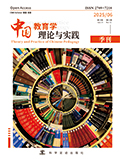

唐宪宗元和三年“贤良方正能直言极谏科”共取牛僧孺、皇甫湜、李宗闵、李正封、徐晦、贾餗、王起、郭球、姚衮、庾威、吉宏宗十一人。以史学与文学视角将该年十一位士人置于核心位置并展开研究, 其实质属于傅璇琮先生“科举与文学”研究范式下的分支。应试该科不仅为这些士人提供了入朝的机会, 也持续影响着他们之后的政治生活与文学创作。受及第科目影响, 他们大多曾在仕途的前半程担任言谏类官职, 体现“直言极谏”的特征。其中部分士人参与党争, 部分士人与一代名臣裴度相交。“直言极谏”的品质伴随着他们仕宦生涯, 与当朝权贵的联系影响着他们的仕宦经历, 成为他们政治活动的相交点。以从政为主导的生活促使他们在创作上偏重政论文与言事赋, 私人话语多体现在以吟咏风景、记录琐事为主要题材的诗歌创作中, 唱酬赠答诗亦是他们与白居易等文坛名流相交的佐证。相似的任官经历、政坛交往与接近的创作经历、文学交游最终构成了这些士人的群体性特征。
In the third year of Yuanhe of Emperor Xianzong of the Tang Dynasty, eleven scholars including Niu Shengru, Huangfu Chik, Li Zongmin, Li Zhengfeng, Xu Xi, Jia Jin, Wang Qi, Guo Qiu, Yao Gun, Yu Wei, and Ji Hongzong were admitted to the examination of the “virtuous and outspoken”. From the perspective of history and literature, eleven scholars in that year were placed at the core and studied, which in essence belonged to a branch of Mr. Fu Xuancong's research paradigm of “Imperial Examination and Literature”. The imperial examination not only provided these scholars with opportunities to enter the imperial court, but also continued to influence their political life and literary creation. Influenced by the subjects, most of them served in the first half of their careers as officials who criticized and admonished, embodying the characteristics of “speaking out and remonstrating extremely”. Among them, some scholars participated in the party struggle, and some scholars intersected with a generation of famous minister Pei Du. The quality of “speaking frankly and remonstrating extremely” accompanied their official career, and the connection with the dignitaries of the current dynasty influenced their career experience and became the intersection of their political activities. The life dominated by politics prompted them to pay more attention to political essays and words and things in their creation. Private words were mostly reflected in the poetry creation with chanting scenery and recording trivial matters as the main theme, and the poems given as a reward were also evidence of their intersection with literary celebrities such as Bai Juyi. , Similar official experiences and close literary experiences eventually constituted the group characteristics of these scholars.